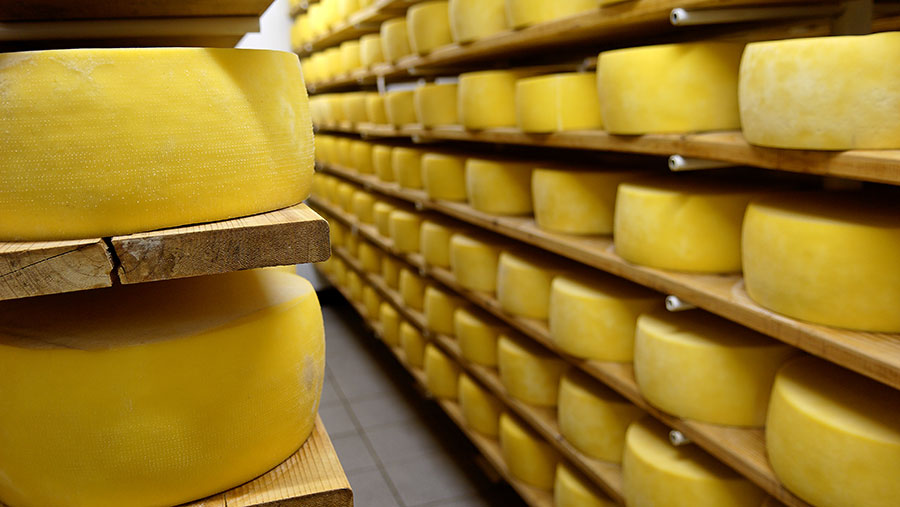Coronavirus: EU proposes €80m meat and dairy aid package
 © Adobe Stock
© Adobe Stock UK dairy and livestock farmers could benefit from an agricultural aid package being put together by the EU.
Brussels has proposed an €80m (£69.9m) package to support the agri-food markets worst hit by the effects of the coronavirus pandemic.
Although Britain left the EU on 31 January it remains under its marketing policies until 31 December 2020. This means the UK is still eligible to take part in the Private Storage Aid (PSA) scheme.
See also: Coronavirus: Applying for farm support schemes
The scheme works through payments to processors and manufacturers to incentivise storage, covering some of the costs incurred.
Under PSA, ownership of the commodity remains in the hands of the producer, unlike intervention storage where the government buys it from the market.
With surplus produce removed temporarily from the market, supply is more closely matched to demand and prices may stabilise.
The aid would be divided across the farming sectors with roughly:
- €30m (£26m) for dairy
- €26m (£22.7m) for beef
- €20m (£17.5m) for sheep and goats.
Significant step
NFU Brussels office director Robin Manning welcomed the aid package as a significant step.
“These are important measures that are not taken lightly. They can stop prices spiralling downwards and help the market re-establish itself,” Mr Manning said.
Agreement on the assistance was achieved after sustained lobbying for aid backed by a joint letter from all 27 member states calling for the EU Commission to act, he said.
In addition to the PSAs, the commission has agreed to an exceptional derogation from EU competition rules for the milk sector, as well as flowers and potatoes.
AHDB analyst Kat Jack said this meant the milk sector would be allowed to collectively take measures to stabilise the market, for example, collectively planning milk production.
“[The EU Commission is] also allowing flexibility in the EU school milk, fruits and vegetables scheme to allow reprioritisation of funding towards crisis management measures,” Ms Jack added.
The measures should be adopted by the commission at the end of April, at which point full details of the proposals will be revealed.
Long-term problems
Once the storage period covered by the payments comes to an end, the product will come back on to the market.
And this could cause its own set of difficulties, according to milk industry expert Chris Walkland.
Although Mr Walkland said it was better than nothing to have PSA payments, he raised concerns that storage simply delayed the functioning of the market.
“It is a gamble to see if product stored now can be sold for more money in a few months’ time when it floods back on to the market,” he said.
Mr Walkland also called for further support for beleaguered UK farmers via a cash injection into their businesses.
“About 550 UK dairy farmers are in desperate straits right now – they have poor prices and face delayed payments.
“The PSAs are welcome but anyone assuming they alone will fend off this crisis is seriously deluded.”
PSAs sector by sector
The details of the package are yet to be ratified and could be subject to change, as member states need to discuss and vote on the proposals.
The products included must meet certain eligibility criteria including age and minimum amounts of product stored. Provided those criteria are met there is no upper limit for a country to submit.
The total tonnages offered will be shared out among the EU countries.
The proposals are as follows:
Dairy
For dairy the €30m total is to store skimmed milk powder (SMP), butter and cheese. This is broken down into:
- Butter €14m (£12.2m) – 140,000t for three to seven months
- Cheese €10m (£8.7m) – 100,000t two to seven months
- SMP €6m (£5.2m) – 90,000t for three to seven months
The cheese sector is treated slightly differently, with tonnages allocated to EU countries at the outset. The allocation for UK product is yet to be announced, although it is widely reported to be around 4,500t.
Beef
The €26m is for a 25,000t allocation of steak-quality beef. A PSA scheme for beef has not been triggered since the latter years of the BSE crisis in 2002.
The proposed PSA is for steak-quality only because demand for higher-end cuts has plummeted. While mince is seeing increased sales for home-cooked meals, consumers are reluctant to spend on quality cuts.
As beef production continues the quantity of surplus steaks is mounting, putting pressure on prices.
Sheep
The €20m for sheep and goat meat provides PSAs for up to 36,000t. This is to support storage for up to five months with a minimum period specified of two months.
Nate Donnay, director of dairy market insight at commodity analyst INTL FCStone, said the €30m EU package for PSA was more of a gesture than a solution, but the EU Commission could end up spending €300m (£262m) on intervention purchases by the time the crisis is over.
He contrasted the scale of the funding with the $900m (£730m) being spent by the US government to buy dairy products over the next six months that will then be largely donated to food banks to support Americans in need.
A separate $2.9bn (£2.35bn) fund will be used to buy a wider range of foodstuffs.
However, Mr Donnay said even spending on that scale would still leave surplus product on the market until regular demand improved, meaning prices were likely to stay low until well after stay-at-home orders were lifted.
